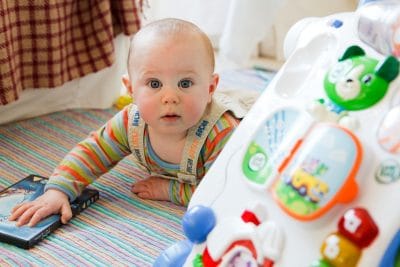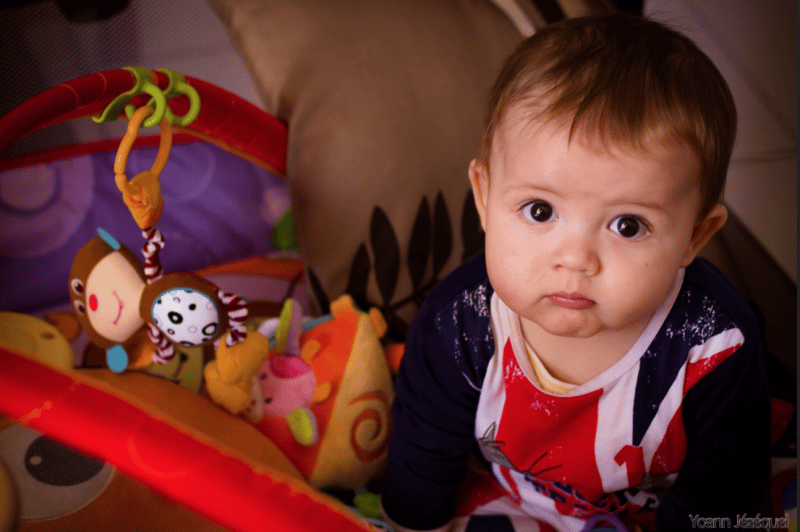
For any parent, the safety of your baby is of the utmost importance. While the safety precautions one can take to “baby-proof” a house are often common sense, there are many factors that can be easily overlooked, and could lead to an accident.
This September is National Baby Safety Month. While your home may already be equipped with the latest baby safety products, make sure you understand how to combat some of the most common hazards that can threaten an infant’s well-being. Take these precautionary measures and ensure your baby lives a long, healthy life.
Table of Contents
Cribs
Cribs are an incredibly important baby accessory that protect your baby when they sleep, and can
help keep them from wandering. While you may feel that your baby would be more safe sharing your bed with you, think again. For infants under 3 months, the risk of death by suffocation is tripled if you sleep with them on a bed or a couch.
While a crib can protect your baby from any accidental smothering, your baby is still vulnerable to suffocation by accessories, such as toys and pillows, within the crib. Thus, the golden rule with cribs is “Less is More.” A crib should have no more than a firm mattress and a fitted crib sheet. If you’re worried about your baby getting cold, due to the absence of a blanket, buy a nice, warm onesie. Within their first year of life, babies really shouldn’t have anything but these 2 items in their crib, in order to prevent suffocation.
SIDS
SIDS stands for “Sudden Infant Death Syndrome” and is the leading cause of death for infants age 1 month to 1 year. While the specific causes of SIDS are still unknown, babies often succumb to SIDS in their sleep.
The best preventative measure you can take to protect your baby from SIDS is making sure you put your baby to sleep on their backs. Putting a baby to sleep on their stomach or side can subject them to breathing in their exhaled carbon dioxide. Some doctors even suggest the use of pacifiers when your baby sleeps to decrease the chance of SIDS occurring.
While there are many suggested measures a parent can take to try and prevent SIDS, the fact is, SIDS is an unpredictable phenomenon that can happen to anyone. If you have been affected by SIDS or know someone who has, look at this site on how to cope with such an unfortunate, devastating loss.
Water
With babies, drowning can occur in a blink of an eye. The most important thing you can do to prevent drownings is to always keep your baby under close supervision. However, there are many household appliances that can accidentally lead to a potentially fatal accident for your baby.
When baby proofing your house, make sure water surfaces, such as toilets, are protected from your baby. Babies often use toilet seats to hoist themselves up into a standing position and can fall into the bowl head first. To prevent these kinds of drownings, buy a toilet lock. This will ensure that your toilet stays closed when not in use.
Infant bathing seats are also something you should know how to use properly. These seats can be dangerous due to the false sense of security they provide parents. When bathing their baby, parents think the seat is sturdy enough for them to leave the bathroom for just a second. However, these seats can tip, leaving the baby in a life-threatening position.
When it comes to water safety and your baby, you can protect them best by always keeping a close eye on them. Never leave them alone in the tub, and make sure your baby is secure in their crib before you attend to something else.
Pets and Animals
Before you have a baby, it’s common to have a pet. Whether it be a cat or a dog, your pet can get upset at your little one for taking up all of your time and attention. Once you know you’re expecting a baby, you should spend the next several months preparing your pet. Here a couple of things you can do to adjust your pet to a baby:
- Accustom your pet to baby cries by playing them at random times throughout the day
- Begin to spend less time with your pet so they get used to something else consuming your attention
- Sprinkle a little baby powder or baby oil on your skin so they become comfortable with this new, foreign scent
- Teach your pet to lie next to you and to not jump on your lap without your command
Read more on how to prepare your pet for the baby here.
National Baby Safety Month
This September, to make sure your home is thoroughly safeguarded from accidents, check out this calendar that gives you a specific action you can take each day to improve your infant’s safety.
Another great way to find possible safety risks in your home is to crawl around on your hands and knees. What may not even register as dangerous from your perspective, you may find incredibly hazardous from your baby’s line of sight.
With the addition of a new baby, your daily goal is to keep them safe and happy. Let’s take this September to evaluate the safety precautions we take for our children’s well-being and appreciate their presence in our lives.
Photo courtesy of Pixabay
